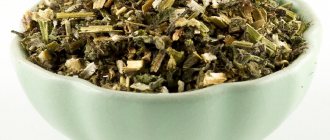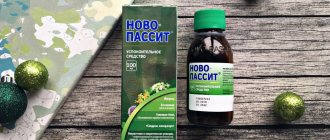Hello!
The famous motherwort plant has excellent pain-relieving properties. In addition, motherwort is good for the stomach, women's health, heart and blood vessels. Both motherwort root and the above-ground part of the plant are used.
Motherwort reaches 30–200 cm in height. It has a tap root. Its stem is tetrahedral, straight, sometimes branched.
Motherwort leaves are petiolate. The lower leaves are the largest, up to 15 cm long; closer to the top they become smaller.
The flowers are small, collected in spike-shaped inflorescences, intermittent, located at the ends of stems and branches in the axils of the leaves. Flowers have 4 stamens. Motherwort blooms throughout the summer.
The fruit is a coenobium and consists of 4 evenly developed nut-shaped single-seeded parts - petioles. Each column, 2–3 mm long, is enclosed in the remaining calyx. The fruits spread by clinging to animal hair and human clothing.
Pharmacodynamics and pharmacokinetics
Motherwort is a herbaceous perennial plant, classified by botany into the Lamiaceae or Lamiaceae family. The generic scientific name of this plant translated from Latin sounds like “lion’s tail”, due to the distant similarity of the apical leaves with the tassel of a lion’s tail. Other common names are dog nettle (grass), heart grass , dead nettle, heart grass . From these names themselves, it becomes clear what motherwort helps with and for what diseases its medicinal properties will be useful.
Photo of the Motherwort plant
Motherwort herb, medicinal properties and contraindications
According to Wikipedia, in medical practice and folk recipes for the preparation of motherwort tincture, the benefits and harms of which will be discussed below, two types of this medicinal herb are used, namely: Motherwort Five-lobed (shaggy) and Motherwort Heart (ordinary), since the effects of other types of plants have been studied not good enough. The infusion is prepared from the dried upper parts of the plant, including flowers and leaves, for which the extractant can be ethanol ( ethyl alcohol ), more suitable for adult patients, or water (boiling water), which is the preferred solution base for children.
The medicinal properties and contraindications for motherwort tincture are dictated by the properties of the plant components included in the prepared raw materials. Dry motherwort herb includes alkaloids (stahydrine, leonuridine, choline , leonurine), beta-carotene , flavonoids ( quercetin , rutin , quinqueloside, cosmosin, quercimeritrin, hyperoside, etc.), leonuride, saponins , mineral salts (sulfur, potassium, sodium, calcium), approximately 5% tannins , vitamins (A, C, E), up to 0.05% essential oil, sugary and bitter ingredients, organic acids (citric, vanillic, malic, ursolic, tartaric), due to which similar effects occur valerian is sedative in nature .
Photo of motherwort grass
Motherwort is characterized by its positive effect on the functionality of the central nervous system, calming effects, potentiation of sleep (without a hypnotic effect), reduction of high nervous excitability , antagonism towards analeptics and their convulsive effects. The effectiveness of this remedy is observed in neurasthenia , psychoasthenia and neuroses occurring against the background of insomnia , a feeling of overexertion and increased reactivity. The drug is capable of correcting disorders of the nervous system of a functional nature that occur during premenopause and menopause .
Motherwort is also an effective remedy for blood pressure ( lowers blood pressure or increases blood circulation, heart rate and slows down the heart rate), is used for the prevention and treatment of cardiovascular pathologies ( angina pectoris , myocarditis, cardiosclerosis , palpitations, etc.), and is used for VSD ( vegetative-vascular dystonia ) to regulate heart rate.
The use of motherwort herb is useful in the treatment of gastrointestinal ulcers , painful menstruation, epilepsy , dyspeptic symptoms, thrombosis , bronchial asthma , Graves' disease , shortness of breath , uterine bleeding, paralysis , neuralgia , cough and other painful conditions in which its positive medicinal properties are manifested. The drug has a general strengthening, diuretic, antispastic and anti-inflammatory effect. In homeopathy it is used in case of patient complaints of flatulence , cardiac dysfunction and hyperthyroidism .
However, when using this herbal preparation, it is necessary to take into account not only the beneficial properties, but also the contraindications of motherwort, because often the benefits and harms of motherwort herb depend on the dosage of the remedy, the appropriateness of its use and the correctness of use. For example, motherwort in any form is contraindicated for pregnant women due to the increased threat of miscarriage , provoked by stimulation of uterine contractile function, for hypotensive patients due to a decrease in the drug , for women with heavy, prolonged menstruation , due to the possibility of their intensification. Alcohol tincture should not be taken by people suffering from alcoholism , and an aqueous solution and other motherwort preparations should not be taken by people with allergies .
How is it useful for humans?
From a chemical point of view, motherwort is a combination of essential oils, alkaloids, glycosides, iridoids, flavonoids, terpenoids, caffeic, citric and malic acids, tannins, choline and vitamin A.
Research conducted by the Chinese has shown that the beneficial chemicals found in motherwort reach their maximum concentration during the flowering period of the grass. By the way, in ancient China it enjoyed the fame of a long-lived plant.
In Greece, motherwort tinctures were given to pregnant women to ease the process of childbirth and calm nerves after the birth of a child. By the way, the Greeks called this plant “the mother of grass.” In addition, the ancient Greeks used motherwort to strengthen the heart. And in medieval Europe, this herb was known as a medicine for cattle.
Today this medicinal herb is known as:
- Medicine for the heart;
- Diuretic;
- Anti-inflammatory;
- Antispasmodic;
- Astringent;
- Carminative;
- Stimulation of menstruation;
- Sedative.
Motherwort is considered useful for treating mild forms of Graves' disease. It has antioxidant and immunostimulating properties and has a positive effect on the central nervous system. The juice of this herb is known to accelerate the removal of toxins from the body, and also improve the functioning of the kidneys, liver, gallbladder and bladder.
But best of all, motherwort is known as a heart herb (the name of one of the varieties of this plant). Its extract is useful in the treatment of chronic cardiovascular diseases in the elderly. Some varieties have a sedative effect, reduce muscle spasms and lower blood pressure. Studies have shown that the herb extract slows blood clotting, prevents thrombosis, reduces the amount of fat in the blood, and also calms the heartbeat if it is too fast.
Herbalists use this plant to treat rheumatism, bronchitis and asthma.
The herb extract helps with thyroid overactivity, but at the same time is completely safe for healthy people, since it does not affect the secretion of thyroid hormones. In traditional Chinese medicine, motherwort seeds are known as an effective diuretic. Other beneficial properties include the ability to speed up metabolism, improve digestion, relieve intestinal cramps and reduce swelling. This plant will protect men from prostate adenoma and problems with potency.
Indications for use
Indications for use of Motherwort tincture include:
- arterial hypertension in the initial stage;
- neurotic and asthenoneurotic painful conditions occurring with sleep disturbances ;
- neurocirculatory dystonia;
- feeling of irritability;
- neurasthenia;
- manifestations of vegetative-vascular dystonia ;
- tachycardia and increased excitability observed with hyperthyroidism ;
- neuroses of cardiovascular origin;
- vegetative neuroses during premenopause, accompanied by cardialgia , tachycardia and elevated blood pressure;
- mild sleep disturbances
- emotional excitement.
Health benefits for women
To treat female diseases, herbalists use the flowering tops, leaves and stems of the plant. Decoctions and infusions are useful for treating:
- amenorrhea;
- dysmenorrhea;
- uterine fibroids;
- ovarian cysts;
- endometriosis;
- postpartum depression;
- PMS.
Special chemicals contained in motherwort have been found to be gentle on the uterus in cases of cycle disruption. The same herb, according to herbalists, is useful for women with painful menstruation.
Infusions and decoctions of motherwort help fight anxiety, tachycardia, headaches and dizziness, sleep disorders caused by PMS or menopause. In addition, researchers suggest that motherwort reduces the risk of developing uterine cancer, prevents infertility, and improves the fertility of the female body.
After childbirth, the plant extract is useful for calming the nerves and preventing postpartum depression (but during this period, the herb can only be used with the permission of a doctor, so as not to cause bleeding).
During pregnancy, dog nettle is strictly prohibited as it can cause miscarriage. Motherwort is also prohibited for women with heavy menstruation (as it can increase bleeding).
Contraindications
Contraindications to taking Motherwort tincture are:
- personal hypersensitivity ;
- pregnancy / lactation ;
- alcoholism (for alcohol tincture);
- ulcerative pathologies of the gastrointestinal tract during exacerbation;
- heavy/prolonged menstrual bleeding ;
- severe phase of arterial hypotension ;
- age up to 12 years.
You should take this medication with caution when:
- liver diseases;
- traumatic brain injuries;
- brain pathologies;
- in childhood (after 12 years).
Side effects
When taking Motherwort medicinal tincture, the following side effects may be observed:
- local allergic manifestations , most often expressed by redness , swelling of the skin and/or skin rash / itching (in case of personal hypersensitivity);
- feeling dizzy ;
- phenomena of dyspepsia ;
- fast fatiguability;
- daytime decrease in physical/mental performance;
- drowsiness.
Motherwort tincture, instructions for use
It should be remembered that you should not self-prescribe any sedative medications , which include motherwort herb. Before taking Motherwort tincture, you need to consult with your doctor, who, after conducting all the necessary research and the advisability of using this tincture, will recommend how to take it in drops and how many drops an adult patient or child should take. Also, if a patient is diagnosed with painful conditions associated with emotional arousal , the doctor can advise how to drink it to calm down.
Motherwort tincture drops are indicated for oral administration only, which is best taken approximately 30 minutes before meals. Patients of the adult age category (after 18 years) are recommended to take 30-50 drops of infusion 3-4 times every 24 hours. For children over 12 years of age, the dosage is calculated based on the ratio of 1 drop of alcohol solution per 1 year of life. The tincture can be taken either in pure form or diluted with water (¼ cup).
The duration of the therapeutic course is determined by the doctor individually, taking into account the degree and nature of the severity of the disease state, the characteristics of the pathological process, the patient’s personal response to the treatment and therapeutic effectiveness.
With menstruation
Herbal preparations help get rid of unpleasant symptoms during menstruation.
The following recipes:
- Take dry raw materials in the following quantities: motherwort, fragrant forest cabbage - 20 g each, blackberry leaf - 25 g, cinnamon - 15 g, hawthorn - 10 g. Brew a mixture of herbs in accordance with the instructions for preparing tea: 2 tsp. means for 250 ml of boiling water. The effect appears after 7-10 days of treatment.
- Take 2 tbsp. l. hawthorn flowers, chamomile, motherwort and swamp cinnamon. Pour 2 cups of boiling water over them, boil for a couple of minutes, then leave for 4 hours. Drink a third of a glass daily 4 times after meals.
For the thyroid gland
Motherwort is used to treat hypothyroidism, a persistent deficiency of thyroid hormones. To do this, take half a cup of motherwort infusion 2 times a day before meals.
Motherwort with other herbs is also used to treat thyroid diseases. The plant is brewed with mint, valerian, hawthorn and green walnuts.
For the kidneys
Motherwort has a diuretic effect and is used to treat kidney diseases and relieve edema.
Most often used as tea, decoction, infusion. Dosage, dosage regimen and course duration are prescribed by the attending physician.
External use
Motherwort decoction and infusion are used for compresses. Motherwort compresses are used to treat abscesses, ulcers and wound healing. The decoction is also added to the bath. Take a soothing bath with motherwort for 15 - 20 minutes.
Analogs
Analogs of Motherwort tincture include medicinal preparations similar to it in their sedative and cardiotonic effects:
- Valerian (tincture, raw materials, tablets);
- Alora;
- Peony tincture;
- Bioson;
- Melissa (tincture, raw material);
- Antistress;
- Belisa;
- Hawthorn (tincture, raw material);
- Corvalol;
- Valemidin;
- Sonafit;
- Valdispert;
- Corvaldin;
- Dormiplant;
- Barboval;
- Sungmil;
- Valocormid;
- Tricardin;
- Karvelis;
- Menovalen;
- Korvaltab;
- Sedasen;
- Novo-Passit;
- Quiet;
- Persen;
- Sedavit;
- Phytosed;
- Donormil;
- Florised , etc.
Which is better – motherwort or valerian?
There is no clear answer to the question of which is better - motherwort or valerian . These medicinal plants are very similar in their main action and, by and large, differ only in some contraindications and the degree of their effectiveness. When choosing one of these therapeutic agents, the doctor, first of all, must be guided by the characteristics of the disease diagnosed in the patient and his individual response to the treatment, according to which a personal therapeutic regimen is selected.
In turn, both of these drugs are often mixed and recommended to be used together in different combinations of sedative medications, both factory-made and home-made. The most common folk recipe that receives positive reviews is the VKPBP , which includes five tinctures: peony
,
valerian , motherwort , corvalol , hawthorn .
Tincture of peony, hawthorn, motherwort, valerian, corvalol
Before taking motherwort , valerian , hawthorn , peony , Corvalol , you need to purchase these tinctures at the pharmacy and mix them in a dark glass vessel in equal proportions, for example, 25 ml each (in this case, you can limit yourself to 15 ml Corvalol ), after which take 10-15 drops orally every day (allowed with ¼ glass of water). In case of insufficient positive effect and in the absence of allergic manifestations, you can increase the daily dosage to 25 drops.
Reviews of a mixture of tinctures of valerian , motherwort , hawthorn , peony , Corvalol indicate a significantly greater sedative and cardiotonic effectiveness of this mixture, but also warn patients against its uncontrolled and excessive use, since such soothing drops not only multiply the positive properties of plants, but also potentiate their side effects.
Preparation of medicinal raw materials
For medicinal purposes, the flowering tops of the grass are used, which are collected during flowering (June - August). Motherwort is an eternal companion of humans, and can often be found in landfills and in heaps of garbage near homes.
Motherwort settles on the side of country roads, and, by the way, all these places are a bad option for harvesting medicinal plants. Environmentally friendly medicinal raw materials can be obtained by harvesting motherwort that has grown in the steppe, along dry river bends, etc. For drying, motherwort is laid out in a loose layer under sheds or in bunches suspended in attics.
In folk medicine, the use of motherwort root is practiced, which is dug up in the fall, at the end of the plant's growing season.
Motherwort tincture during pregnancy (and lactation)
The question of whether pregnant women can take motherwort, and whether this drug can be taken while breastfeeding , certainly worries many women, since the state of their nervous system during these periods is not in the best condition and often requires external support. The answer to the question of whether it is possible to drink motherwort tincture during pregnancy and during breastfeeding (breastfeeding) can be found in the official instructions, in which these stages in a woman’s life are listed as contraindications to the use of the drug due to the inclusion of ethyl alcohol . However, as practice shows, not everything is so simple and for pregnant and lactating women there is a way out of this situation, which consists in taking an aqueous solution of motherwort or tablets based on it, reviews of which are positive even in these cases.
Tablets or water tincture of motherwort during pregnancy in the early stages, or in later periods, as well as during lactation , can be taken by women, and sometimes even recommended for use, in order to bring their nervous system into a proper positive state, contributing to the normal overcoming of this difficult time.
For epilepsy
The plant will not be able to completely cure this disease, but it can reduce the frequency of epileptic seizures. The following folk recipes are used for this:
- Collect the following herbs - motherwort, Danish astragalus, curly lily tubers, lemongrass berries, horsetail ephedra. It is better to take 1 teaspoon of each plant. Pour the mixture with 300 ml of boiling water, leave for 15-20 minutes. Use the product morning and evening.
- Prepare 500 ml of boiling water, 2 tsp. herbs. Mix, then leave for about 2 hours. Drink 1-2 tablespoons before meals. Repeat the procedure up to 4 times during the day.
Reviews of Motherwort tincture
sedative herbal preparations are quite often discussed on the Internet , which, naturally, includes motherwort tincture, reviews of which in the vast majority of cases are completely positive. People who use this tincture, or the mixtures in which it is included, to maintain their nervous system in adequate condition, as well as to treat various heart disorders, note the high effectiveness of this remedy and the almost complete absence of negative side effects. Among the negative qualities, the most often mentioned are the bitter taste ethanol content .
It is precisely because of the alcohol base of motherwort tincture that most women are afraid of using it during pregnancy and breastfeeding , however, there are those who practice taking small doses of this drug and do not see this as a significant problem.
Benefits for the cardiovascular and nervous system
Many herbalists believe that there are no other plants in nature that are more beneficial for the heart and nervous system. Alkaloids contained in the desert have a vasodilating effect and also have a relaxing effect on smooth muscles, including the heart.
Dog nettle extract has been scientifically proven to lower blood cholesterol and triglyceride levels, which is also important for healthy cardiovascular function. Having a mild diuretic effect, motherwort regulates blood pressure. In addition, it suppresses arterial calcification.
This herb has sedative properties, improves sleep, relieves anxiety, and regulates heartbeat. Tea made from it is useful for neuralgia and chronic fatigue. By the way, motherwort has stronger sedative properties than valerian or lily of the valley. The digestive system will also benefit from this tea. In particular, the herbal remedy improves well-being in cases of indigestion and intestinal inflammation.






